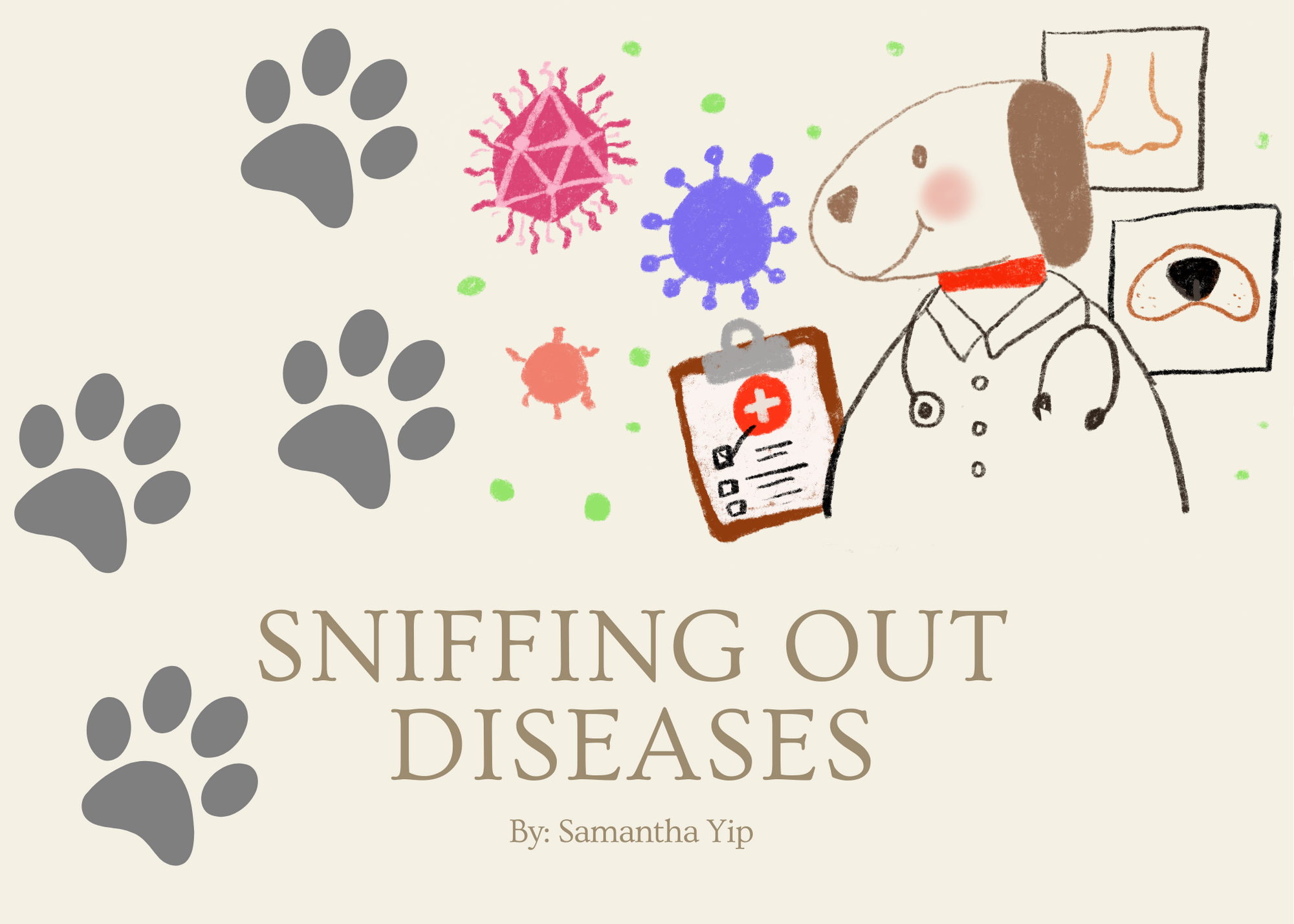 Author: Samantha Yip
Author: Samantha Yip
Editor: Sopyda Yin
Graphic Editor: Miranda Kreal
When people think of doctors diagnosing a disease, they assume getting blood tests or imaging scans done at a clinic. Or, in our current times, tests for the COVID-19 virus are often conducted with PCR or antigen tests. However, what if you could be diagnosed for diseases and disorders with a simple sniff of your body odor?
In the past, physicians in ancient China and Greece like Hippocrates have used smell to diagnose diseases. Yet, aside from using a patient’s “sweet” breath to diagnose diabetes, smell is rarely used as a diagnostic tool. Some people claim that they can diagnose diseases based on scent, but research into these claims have not been studied closely until recently.
It is well known that dogs have a much better sense of smell than humans (up to 100,000 times better), as they have about 40 to 50 times more scent receptors. Many studies looking at the possibility of diagnosing diseases based on smell have used dogs. In one study, researchers trained beagles to detect lung cancer solely based on blood serum samples from cancer patients. After training, the dogs correctly identified lung cancer patients 96.57% of the time and identified healthy people without lung cancer 97.5% of the time. In another study, researcher Riad Sarkis trained 18 dogs to detect COVID-19. From a pool of 1680 samples that were identified to either be COVID-19 positive or negative via PCR tests, the dogs were able to correctly identify 92% of the positive samples and 100% of the negative samples. While the smell test may not be as accurate as a PCR test, using dogs to sniff out COVID-19 may be a good alternative when there is not enough resources or time available to run PCR tests. Dogs are already used to detect drugs and bombs at airports and events, so perhaps we can also use trained dogs to screen for diseases in large patient populations. In the future, perhaps once dogs deem a patient to have a particular disease, physicians can schedule appointments and conduct additional tests.
Even though humans do not have a keen sense of smell compared to dogs, there have been documented cases where humans were able to diagnose diseases based on body odors. Some people, including a woman named Joy Milne have claimed that they can smell Parkinson’s Disease. Years before her husband Les displayed clinical signs of Parkinson’s Disease, Joy noticed that he suddenly had an “overpowering sort of nasty yeast smell” that grew stronger and stronger before her husband was finally diagnosed with Parkinson’s 14 years later. In one experiment, Joy Milne correctly identified whether people had Parkinson’s disease by simply smelling their T-shirts. Most impressively, one of the patients she deemed as having Parkinson’s was not diagnosed with Parkinson’s at the time, but was diagnosed a year later. Parkinson’s Disease is a neurodegenerative disease that leads to tremors, muscle weakness, and balance problems. There is no specific blood test or brain imaging scan used to diagnose Parkinson’s, so physicians can only make their diagnosis based on symptoms, which often occur only in the later stages of the disease. However, with evidence that Parkinson’s can be accurately diagnosed with smell, researchers began searching for the specific chemical compounds Milne smelled. In a following study, researchers identified 17 chemicals from sebum samples taken from the upper backs of 43 Parkinson’s Disease patients. They then presented a mix of these compounds to Milne, who confirmed that this mixture smelled similar to what she smelled in Parkinson’s patients. In particular, high levels of a compound called eicosane was part of that mixture that Joy deemed similar to the smell of Parkinson’s.
In the future, since not all of us are super smellers, scientists hope to identify the specific odorous biomarkers from many different diseases and develop “electronic noses” that can detect these odorous compounds. This would allow doctors to make better and earlier diagnoses of diseases, as many diseases like Parkinson’s may be preceded by smell before the actual symptoms are observed. For many diseases like cancer, using non-invasive electronic noses would be safer and more cost-effective compared to traditional diagnostic methods like biopsies.









